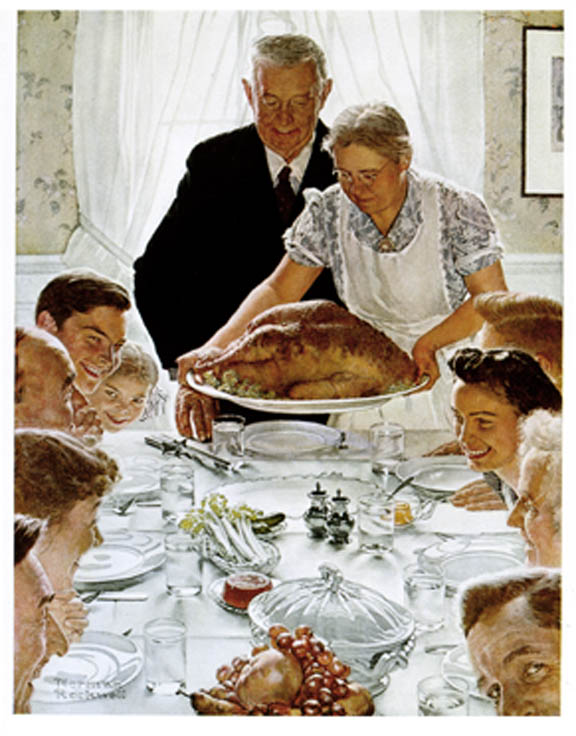
- Norman Rockwell, “Freedom from Want”
The gathering of the Miksches for Thanksgiving yesterday was a joyous affair. Given that I attended it with trepidation, I should learn to stop worrying. I was concerned about contentious debate, but the only political conversation I had was with my wife’s nephew, and that proved to be a substantive economic talk.
This time, there was no fighting over abortion or gay marriage. Maybe that’s because he was recently laid off from his job, and the state of the economy was foremost on his mind. The fact that he has three kids and a wife who works parttime means that he has a stake in coming up with answers.
I didn’t agree with him on everything–say, that lower capital gains taxes will cure the American economy–but that’s okay. We actually saw eye-to-eye on a number of other issues, such as that executive compensation has gotten way out of line and that businesses have become too obsessed with short term profits and that American workers need to be paid more (and executives less) if consumption is to pick up. But more than our agreeing, I liked the fact that people with very different views were engaging in a civil discussion about what we needed to do as a nation.
I was also struck by how the American dream buoys our young people up. Philip is out of work and my own sons are scraping along (one as a grad student, one as a small businessman). They don’t dream the grandiose dreams of a Jay Gatsby or a Willie Loman. They are not interested in great wealth. Yet they are convinced that if they work hard and love their families and strive to be good, this nation will prove bountiful and bestow happy lives upon them. Yesterday it felt possible to believe these things.
Thanksgiving, my favorite of American holidays, reminds us to render thanks for that bounty. Here’s a gratitude passage that I like, delivered by Adam and Eve in Milton’s Paradise Lost (Book IV) immediately before retiring to rest (and before the fall):
Thus at thir shadie Lodge arriv’d, both stood,
Both turnd, and under op’n Skie ador’d
The God that made both Skie, Air, Earth and Heav’n
Which they beheld, the Moons resplendent Globe
And starrie Pole: Thou also mad’st the Night,
Maker Omnipotent, and thou the Day,
Which we in our appointed work imployd
Have finisht happie in our mutual help
And mutual love, the Crown of all our bliss
Ordaind by thee, and this delicious place
For us too large, where thy abundance wants
Partakers, and uncropt falls to the ground.
But thou hast promis’d from us two a Race
To fill the Earth, who shall with us extoll
Thy goodness infinite, both when we wake,
And when we seek, as now, thy gift of sleep.
This unanimous, and other Rites
Observing none, but adoration pure
Which God likes best, into thir inmost bowre
Handed they went . . .
In Milton’s version, there is work in the garden of Eden and sex as well. Adam and Eve have been cutting back the undergrowth and now, at the end of the day, they are thanking God for the abundance and for the promise of children that will help them manage the abundance. They don’t have to engage in special rituals to thank God. Their gratitude comes from the heart, adoration pure.
Why praise God–which is to say, the forces of love and goodness that (so I believe) blow through creation? Because, by praising, we open our hearts and step beyond the narrow confines of self. Today, in our fallen world, we must remind ourselves to be grateful and set up special rituals like Thanksgiving. But what a gift it is to have a day specially devoted to expressing gratitude.

